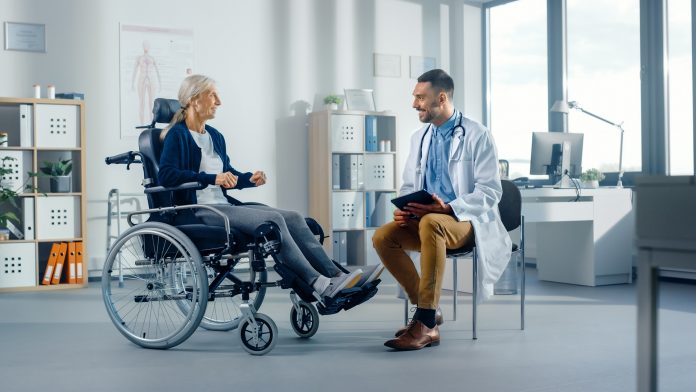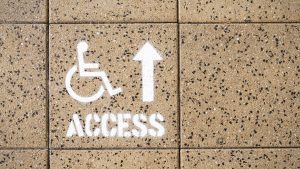
Marine Uldry from the European Disability Forum speaks to Health Europa Quarterly about the challenges people with disabilities face when accessing healthcare.
‘Persons with disabilities have the right to the enjoyment of the highest attainable standard of health without discrimination on the basis of disability.’ So reads Article 25 of the United Nations Convention on the Rights of Persons with Disabilities which has been ratified by all European countries except Liechtenstein. Yet despite this commitment, people with disabilities still often feel like there is a myriad of barriers preventing them from receiving the same level of care as others.
Over 100 million people in Europe who live with a disability can experience physical, financial, and communicative challenges when seeking access to or information relating to health services. Tackling societal prejudices and ensuring the full inclusion of persons with disabilities in society is a key aim of the European Disability Forum, an umbrella organisation formed in 1996 which brings together representative organisations of persons with disabilities.
Lorna Rothery spoke to the EDF’s Senior Human Rights Officer, Marine Uldry, about the importance of advocating for a human rights-based model and how the organisation is working to promote positive action across policy and healthcare to reduce inequities.
What is the role of the European Disability Forum, and what are its key objectives?
The EDF is an umbrella organisation made up of persons with disabilities and represents all types and forms of disability.
In the past, the disability movement was not closely aligned with discussions around healthcare predominantly due to the medicalisation of disability. But in the past few years, especially since the start of COVID-19, we have been more active and engaged on healthcare issues and policies.
We work principally toward advocating at the EU level, towards the EU institutions, such as DG SANTE, and towards initiatives that directly impact the healthcare that persons with disabilities receive. This could include digitalisation, eHealth, access to cross-border healthcare in the EU, or other issues like cancer and Europe’s Beating Cancer Plan. We also engage in discussions with the World Health Organization, especially their European regional offices, as well as with the Council of Europe about issues related to access to mental healthcare.
What are some challenges that people with disabilities may face when accessing or receiving care?
There is still a lot of discrimination faced by people with disabilities. Two years ago, we ran a workshop with our members because we wanted to understand what was happening at the national level, and the picture was pretty similar across many countries. There are still a lot of challenges when it comes to ensuring suitable healthcare facilities are available. For instance, hospitals might be physically accessible, but then doctor’s offices may not be. Likewise, for women wanting to visit a gynaecologist, it may be difficult to find a clinic with suitable equipment.
Communication is also a challenge; a person who is deaf, for example, may not have easy access to a healthcare facility that can provide or support them with sign language or accept a patient accompanied by an interpreter. There is a lack of accessible information about healthcare services for people with disabilities, even for those in integrated care settings. They have almost no information about access to healthcare nor who they can ask for information, or their rights in general. There are also difficulties in ensuring people consent to healthcare procedures.
Misconceptions exist about the healthcare needs of people with disabilities. For example, people who should have access to health screening services or attend a doctor’s appointment to discuss a symptom may be dismissed because it is assumed their conditions are part of their disability. Of course, this can then negatively impact their welfare and lead to a higher risk of mortality.
We have a lot of examples of discrimination during the COVID-19 response, which are outlined in our report: Human Rights Report 2021: Impact of COVID19 on persons with disabilities.
What is the difference between the medical model and social model in the context of health equity, and how are these models impacting people with disabilities?
The medical model predominantly views disability in terms of impairments, pathology or medical issues and completely ignores the barriers that have been created by society and impact the lives and rights of people with disabilities. The person is essentially seen as a ‘subject’ of care to be fixed for them to fit in society.
With the social model and human rights model, the person is at the centre of care. Instead of merely seeing the person’s impairment, it acknowledges the relationship between impairments and the barriers created by society. The social model encourages recognition of the barriers that impact the lives of people with disabilities.
The human rights model goes one step further. It recognises the person as a full right holder. Governments have the obligation to promote and protect their rights.
In the context of health equity, what should be done, and what the Member States should recognise needs to be done, is to ensure that people with disabilities have the right to health, healthcare, and access to health services. This should be based on the rights and needs of the person, paying particular attention to free and informed consent. When people with disabilities ask for access to services or support, this should be granted. Equally, they should never be forced to receive care, and they have the right to refuse it, just like anyone else.
How successful has the implementation of this social care model been?
There is a willingness there to shift from the medical to the social model but it can be challenging and depends on the awareness that people in the medical community have about this approach. Some people, because they have been used to working in a specific way for many years, or even young doctors that have been taught at university to act in a specific way, may find it more difficult to accept this care model. Overwhelmed healthcare systems and budget cuts also make it more challenging to improve healthcare services, provide additional support, and ensure medical professionals are responding to their patients’ needs, feel empowered to do so, and dedicate enough time to them.
Similarly, it is not only relevant to people with disabilities, and we are seeing more conversations happening and greater awareness of the challenges that different societal groups – such as racialised people, women and LGBTIQ+ communities – face when accessing healthcare.
Are there any projects or initiatives that you want to highlight that are helping to improve health equity and awareness around disability issues?
A really good development is actually from the World Health Organization; they already had a global disability action plan for 2014-2021, and now the European regional office is developing a European framework to achieve the highest standard of health for people with disabilities. It is a long-term commitment that shows European countries that they should develop and pay attention to people with disabilities.
In the EU, the European Commission committed to doing more on access to healthcare for persons with disabilities in its 2021-2030 Strategy on the rights of persons with disabilities. The Commission is likely to launch a study on the topic, which we hope could lead to more information about the issue and strong recommendations to improve the situation.
Digitisation is also being discussed more and more. This could be helpful for people who live in remote areas to enable them to have online appointments or if they cannot access a healthcare facility. Digital healthcare has a lot of potential if done properly; it must be accessible to those who want it, but we should also recognise that some people may still want and need in-person appointments. Progress in digital healthcare must not stall improvements to the accessibility of healthcare facilities.

A person who is deaf may not have easy access to a healthcare facility that can provide or support them with sign language, or accept a patient accompanied by an interpreter
What are the initial steps or actions that you would like to see from policymakers and healthcare organisations?
We want to see openness and engagement from governments working with representative organisations of persons with disabilities. We know that sometimes our members, or the EDF, when trying to engage at the European level, are told to speak with the people working on disability rights and not on healthcare.

Member States should recognise what needs to be done and ensure that people with disabilities have the right to health, healthcare, and access to health services
We want healthcare professionals and health ministries to engage with organisations that are representing people with disabilities so that they can understand what the main issues are and be open to conversations and adopt initiatives to increase awareness. Awareness-raising is extremely important, and we can provide guidelines to support that, but if medical professionals do not understand the reasons behind them, then we do not think changes can be properly implemented.
It is good for organisations representing people with disabilities to also understand what is happening on the other side, from the perspective of medical professionals and their challenges, that way we can drive improvements and make progress together.
Marine Uldry
Senior Human Rights Officer
European Disability Forum
www.edf-feph.org
https://www.facebook.com/EuropeanDisabilityForumEDF
https://twitter.com/MyEDF
https://www.instagram.com/myedf_europe/?hl=es
https://www.youtube.com/user/MyEDF
This article is from issue 23 of Health Europa Quarterly. Click here to get your free subscription today.








